iteAustralia’s eCommerce sector is booming, with the market for online shopping forecast to grow by 10.68% per year from a projected $54.31 billion in 2023 to $81.51 billion in 2027.1 For those with aspirations of launching an online store, there’s never been a better time to take the plunge.
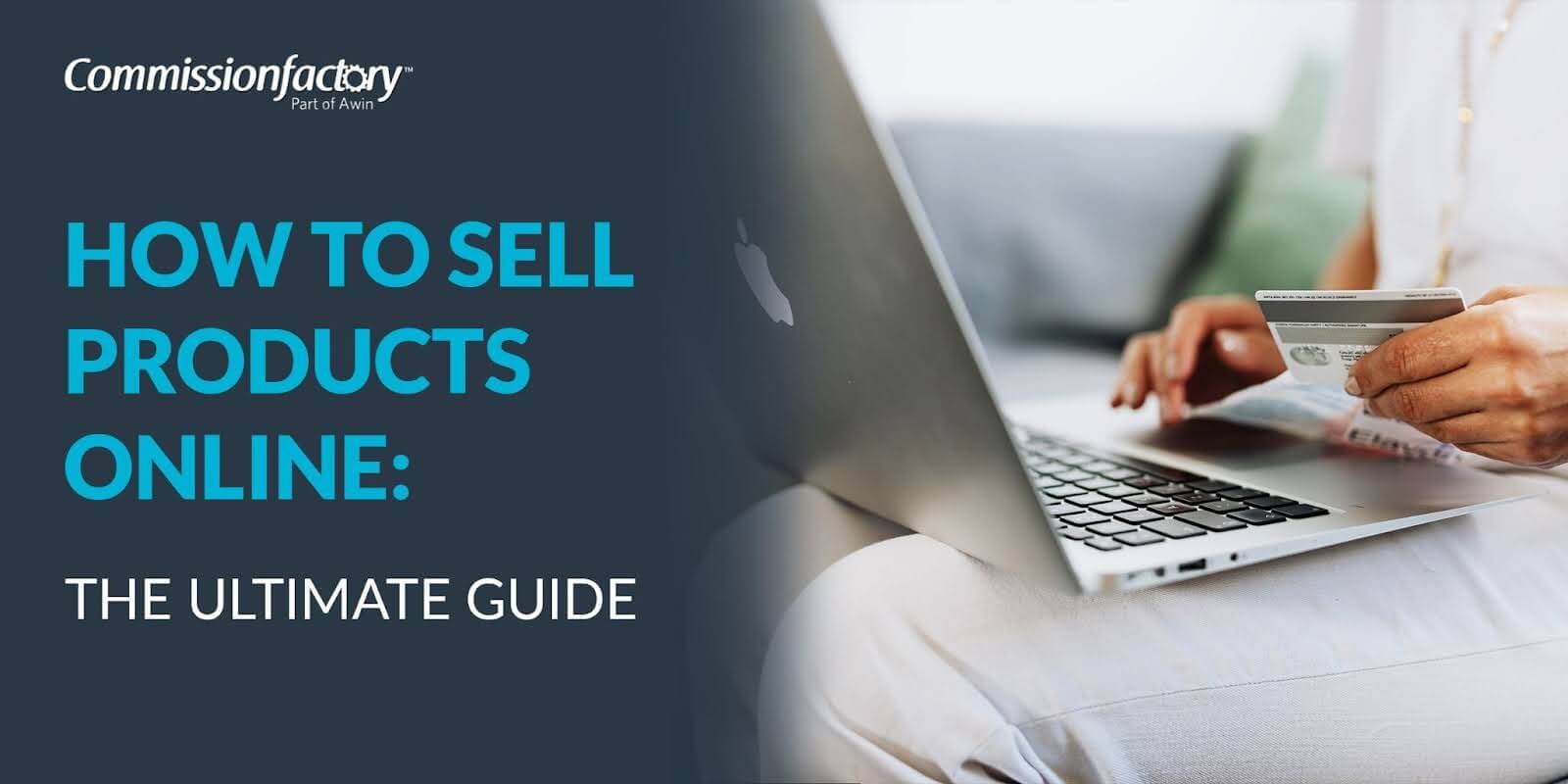
For those needing to learn how to sell products online, this guide delivers an in-depth look at the various strategies, tools, and platforms needed to start an online store. Read on to find out everything there is to know about how to sell online.
Table of contents:
How to Sell Products Online
Setting up an online eCommerce business is relatively easy. All that’s needed is a product and a website to showcase it.
Setting up a successful business that not only survives but thrives is another matter entirely. Following the below steps, however, should help to lay a strong and lasting foundation for any online business.
1. Decide What Products to Sell Online (Find a Niche)
Picking a product to sell online is a major decision that directs every new business’ future. As long as it can be produced consistently and shipped to customers, the sky’s the limit.
Ideally, the product should meet a specific need in the marketplace. It helps for new business owners to have a personal connection to the product, as the best products and services are often driven by passion.
We can broadly divide products sold by online stores and businesses into three broad categories:
DIY Products
DIY stands for “doing it yourself” - any product created at home or in a personal workshop fits into this category. DIY products are best suited for people who have a creative urge and have some specific skills like handicrafts, carpentry/woodworking, jewellery making, and so on.
A major advantage of handcrafted products is the high premium that sellers can often tag on them, especially if they are made using high-quality materials or if they involve intricate craftsmanship. On the downside, production can be expensive, costing a lot of time, labour, and resources.
Starting a 3D printing business is an excellent example of a DIY business idea that is accessible even to people who don’t have high artistic skills. They can make and sell many things, from toys and miniatures to jewellery, components for scale models, and other customised parts.
Wholesale Products
The online business model also makes it easier for newcomers to venture into retail without having to worry about issues like a brick-and-mortar storefront. With the requisite storage space, it’s possible to order almost anything in bulk from marketplaces like Alibaba, Taobao, JD, and even eBay.
Success in this model can be a bit tricky as it requires finding in-demand products that are relatively underrepresented in the market. Another option is to try and deliver better quality products than the competition. But a lot depends on the wholesaler’s reliability, so choose carefully.
Dropshipping
While traditional retail requires both a physical storefront and a storage space for inventory, online retail removes the need for an expensive brick-and-mortar storefront. With that said, there's still the need for physical space to store unsold inventory.
Dropshipping eliminates even that need - only requiring a digital storefront to connect to buyers.2 The storage, handling, and order fulfilment are handled entirely by the wholesale supplier, significantly bolstering margins by eliminating the storage and shipping costs.
Dropshipping allows business owners to focus all their attention and resources on online marketing. Thanks to extreme competition, the margins also tend to be lower than other forms of retail. This kind of business model works best in an underserved niche market such as pet products, baby products, gaming, products etc.
After narrowing it down to a particular niche, it’s time to see if the market is actually viable.
2. Conduct Market Research
Market research is a critical step that cannot be skipped. Take a close look at the industry, potential customers, and most importantly, any competitors already established in the market.
Think of it as an advanced reconnaissance mission that provides crucial insights that will shape every move. Thorough market research allows new entrants to identify whether their business idea is viable in the long run. There are several approaches to market research:
Do Your Own Research
Start by taking a look at any other online stores or brands selling the same/similar products. Look at their pricing strategies, and marketing expenses, and try to figure out their target audience.
On the customer side, try to find their expectations, and identify any unmet needs or common pain points. Use both online and offline surveys for this and, if planning to serve a smaller regional market, consider hiring college students to conduct offline surveys.
Buy Market Research Data
Paying for expert data collected by specialised market research firms is always a solid option. This is particularly useful if an online business is targeting a wider audience spread across the country, or in multiple overseas markets.
There’s no shortage of firms that specialise in market research. The obvious advantage here is that there’s no time lost on chasing data. The downside - market research reports can often cost thousands of dollars, and might not always have quality, niche-related data.
3. Identify and Establish the Target Audience
During market research, you will be able to gain a better understanding of the kind of customers who are more likely to be interested in your product. In eCommerce, your target audience is the people to whom you can sell your products online more effectively.
Competitor research and customer surveys are both great ways to gain deeper insights into the target audience. Focus on finding features to convince the audience the product in question is better than the competition’s.
After establishing a target audience, the next big step involves the creation of buyer personas. A buyer persona is a fictional representation of a product’s ideal customer. This persona is based on data collected during market research and customer research.
To create accurate buyer personas, factor in aspects including target demographics, customer behaviour and preferences, and their most pressing pain points. Buyer personas are essential in successfully connecting with those most likely to buy the product.
Except in special circumstances, target audiences are rarely monolithic. A product can attract customers from diverse backgrounds, age groups, genders, and income groups. Marketing language and tactics that work on one demographic may not work as well on others.
Creating detailed buyer personas affords insight into each group, increasing digital marketing effectiveness. This approach is known as targeted marketing.
4. Create a Brand Identity
A unique and distinctive brand identity is essential to grow any business. Brand identity is the sum of various parts including the brand name, logo, colour palette, typography and fonts, imagery, photography, brand voice, packaging, slogans, and more.
Building an effective brand identity, however, hinges on having a thorough understanding of the target audience. Depending on their preferences, brand identity could be a mix of mature, playful, irreverent, sober, serious, innovative, or traditional themes.
Marketing agencies, graphic designers, freelance designers, advertising agencies, and branding consultants are some of the third parties that can help during the brand creation process.
5. Create a Store and Build a Supply Chain
The final step in selling products online involves setting up a store and having access to products. The latter can be sourced from wholesalers online on platforms like Alibaba and AliExpress. The choice will vary depending on the business model and market niche.
The first four steps mentioned in this guide are common to both online and offline businesses. However, the decision on where to sell online is unique to eCommerce and is also vast and complex enough to warrant a separate section. Scroll down to learn more about the nuances of setting up an online storefront.
Where to Sell Online
Unlike in the physical world, the lack of good store space isn’t never an online constraint. However, decisions still need to be made where the digital store will be located. Ideally, the platform will suit the brand and have the potential to attract the target customers.
Essentially, there are two options when it comes to selling products online:
- eCommerce platforms (hosted or self-hosted)
- Online marketplaces
eCommerce Platforms: Hosted or Self-Hosted
There are two main options when setting up an online store - a self-hosted website or a website hosted on an eCommerce platform. The difference between the two boils down to ownership. Hosted platforms rent out shop fronts, while store operators effectively own a self-hosted shopfront.
Hosted eCommerce platforms are a good option for small to medium enterprises that aren't ready to invest in a bigger eCommerce website. Meanwhile, self-hosted sites are suitable for larger businesses that are ready for expansion and growth.
Both options come with unique strengths as well as disadvantages. Here’s a quick summary of the pros and cons of each:
|
Type of eCommerce Platform |
Pros |
Cons |
|
Hosted |
|
|
|
Self-Hosted |
|
|
Sell Products via Hosted eCommerce Platforms
As already noted, hosting is usually the optimal choice for a small business or startup with relatively modest resources. It’s a beginner-friendly option that has minimal need for advanced technical knowledge of software, IT, and coding.
The eCommerce boom over the last couple of decades has given rise to several major online selling platforms that accommodate small storefronts. Shopify and BigCommerce are two of the best examples of hosted platforms for eCommerce stores.
Selling Online on Shopify

Shopify,4 a Canadian company, is one of the most recognisable eCommerce platforms. It has more than 4.5 million online stores across hundreds of industries, languages, and countries.5
The platform’s popularity is rooted in the simplicity of its offering. What do we mean? Its user-friendly interface means anybody can start an online store, while its scalable architecture means these businesses have plenty of runway for growth.
Shopify’s centralised cloud-based and cloud-hosted eCommerce platform means users can manage everything from orders to analytics from a single dashboard. At the same time, Shopify prides itself on the fact that it’s a “buildable product”, with stackable features.
One of these features is the ability to customise a store using app integrations to personalise each business. For example, Commission Factory’s Shopify app connects retailers with a range of digital partners - from bloggers and influencers to price comparison sites - who can promote products to target audiences.
Shopify Pros
- The platform offers more than 100 visual themes, most of which are mobile responsive. This means the theme will adjust to any device that views it, ensuring a good user experience (UX) regardless of the visitor’s device of choice.
- Shopify provides a 14-day free trial without requiring a credit card.6
- Shopify simplifies the support experience - providing instant access via email, live chat, or phone. It even provides eCommerce courses to help new businesses learn how to get up and running quickly. Shopify’s X page promotes different products to their followers. At the same time, businesses can use search engine optimization (SEO) practices to increase organic traffic to their store.7
- Customers can shop without worrying about who is accessing their details, as Shopify processes each payment with 256-bit SSL encryption and is level-1 PCI compliant.8
- Shopify also offers a mobile app and cash drawer that can accept offline payments.9 The cash drawer can pair with a barcode scanner and receipt printer if need be. The app is also able to keep track of inventory, which is very useful for stalls at a market or festival.
Shopify Cons
- The costs of using Shopify can quickly spiral. The platform charges a monthly fee as well as a transaction fee for each sale. At the same time, the monthly fee unlocks basic features, with more advanced functions locked by plugins that also cost a fee.
Selling Online on BigCommerce
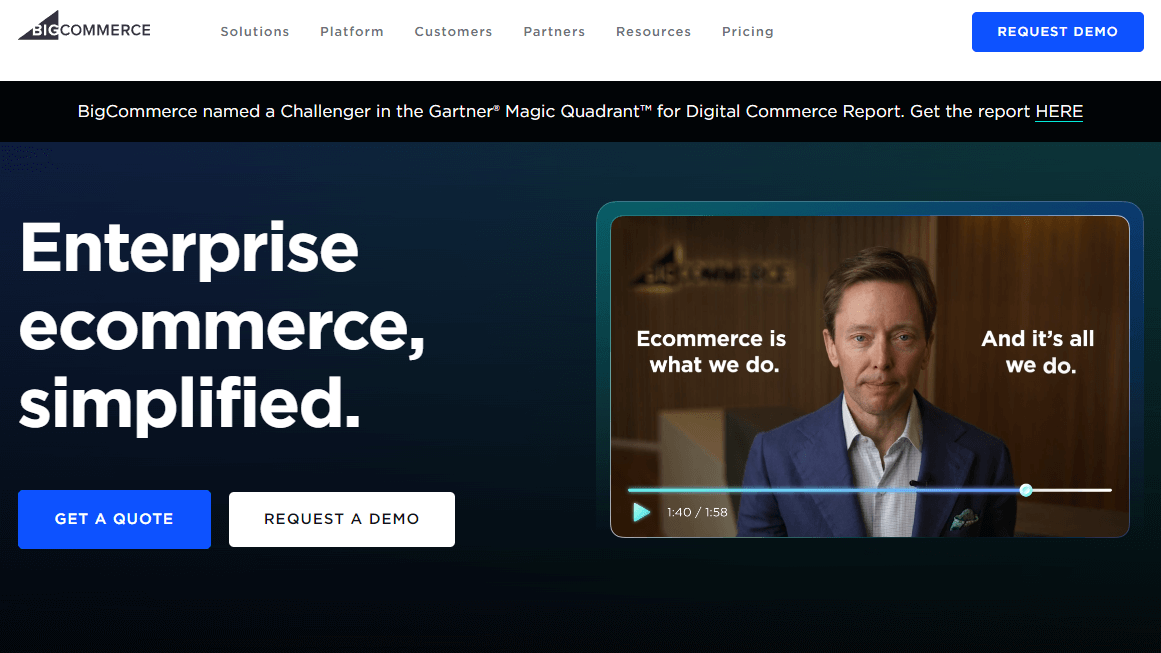
While not as large as Shopify, BigCommerce is known for providing a bigger set of free features as well as greater control over shop front design.10
BigCommerce Pros
- The platform offers almost 300 free and paid designs to its users, most of which are also mobile responsive.
- BigCommerce offers a free 15-day trial so you can see whether it works for you before you commit.11
- BigCommerce is on par with Shopify when it comes to support - offering support via phone, live chat, and e-mail on a 24-hour basis. It also offers courses for those learning the ropes. In terms of SEO, it allows users to integrate with Google Shopping to attract new customers and use product reviews to increase SERP rankings.
- BigCommerce is level 1 certified PCI compliant, just like Shopify. Users can choose their own SSL certificate or use BigCommerce’s.
- BigCommerce allows users to customise their shops and stock by offering a handful of options that Shopify does not. Shop owners can add extra features via custom html code, ensuring their site doesn't ever outgrow the platform.
BigCommerce Cons
- There are fewer free mobile responsive themes available on BigCommerce, which isn't a problem for those happy to pay for a theme. However, for smaller businesses/bootstrap start-ups this might be more of an issue.
Sell Products via Self-Hosted eCommerce Platforms
Self-hosted eCommerce platforms mean the shop owner is responsible for their software. The main advantage here is that it offers full control over all aspects of design, functionality, and advanced features.
Self-hosted platforms also offer greater scalability - unrestricted by pre-defined templates or limited feature lists. However, the downsides include increased costs and a heavier burden when it comes to security and bug fixes. If something breaks, shop owners have to fix it in-house.
As such, self-hosting is not a great idea for small businesses with limited IT capabilities. However, for startups or medium-sized enterprises with IT resources platforms such as WooCommerce, OsCommerce, and Magento are great options.
Selling Online on WooCommerce
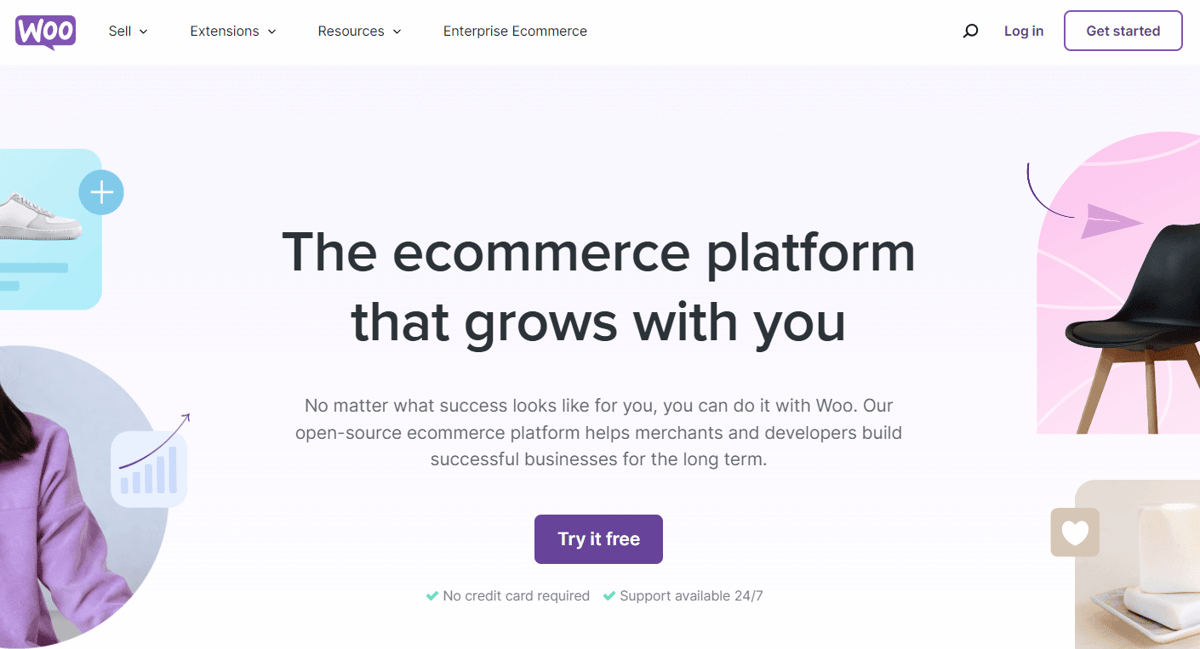
WooCommerce is a free open-source WordPress plugin designed to help large and small merchants looking to build their own online store.12 Since users are tied to WordPress, it’s perhaps not best for businesses that have plans for rapid scaling.
WooCommerce Pros
- It's cost-effective because it’s a free WordPress plugin that also offers free support. It doesn't need a lot of server space either, meaning users can invest more money on other business needs.
- It's easy to set up for those with some WordPress experience and is very similar to adding any other website feature or plugin.
- Almost all of its 79 themes are responsive.
- WooCommerce offers a free 14-day trial without needing a credit card.13
- There are good integrations with marketing add-ons such as email marketing and coupon codes. These can be used to increase a store’s market reach.
WooCommerce Cons
- It doesn’t have as many features as other self-hosted eCommerce platforms on the market. For those looking for a lot of scalability there might be better options out there.
- Only three themes are free.
- Users are tied to WordPress as their content management system (CMS), which could be disadvantageous in some situations.
Selling Online on Adobe Commerce (Magento)
.png?width=1200&height=668&name=Selling%20Online%20on%20Adobe%20Commerce%20(Magento).png)
Adobe Commerce (Magento) is a good investment for those that plan on long-term growth.14 For smaller businesses, Adobe also offers a well-established open-source version.15
Adobe Commerce (Magento) Pros
- Users don't need any coding experience to create a shop front they like.
- Businesses can start small and use the provided tools to scale up.
- Adobe has a huge team of developers to iron out any tech issues.
- Adobe offers SEO resources.
Adobe Commerce Cons
- Custom development can be expensive because of the system’s complexity.
- Larger businesses will more likely need their own dedicated server which can be expensive. For those that can't afford this, website load speeds can slow down.
Selling Online on osCommerce
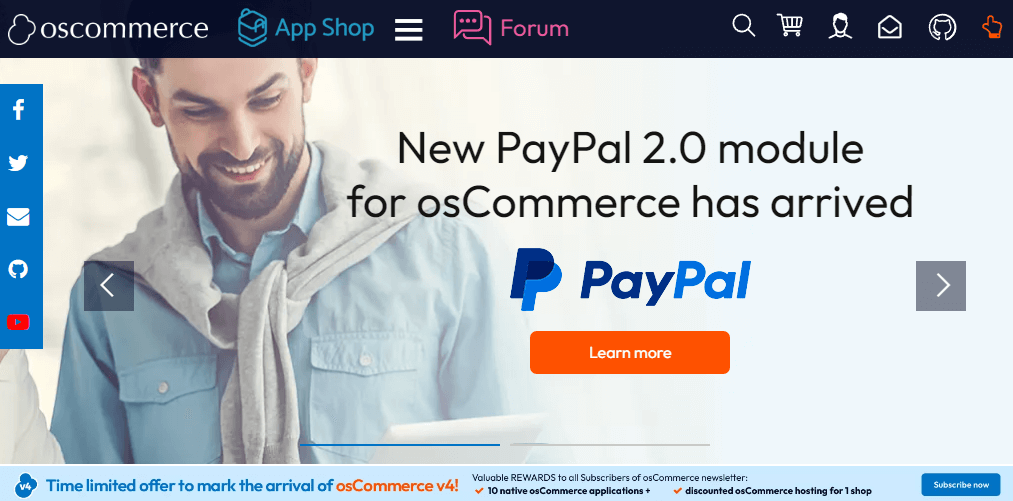
osCommerce is an open-source eCommerce platform that allows individuals and businesses to set up and manage their online stores on any web server with PHP and MySQL.16
osCommerce Pros
- It’s straightforward to use, offering a detailed catalogue system for easy stock tracking even of large inventories.
- It offers plenty of support and a forum for troubleshooting or learning more about any new features it brings out.
- It has plenty of additional features and more than 7,000 plugins to choose from.
- It won't take up much space on a server, which can help keep server costs down.
osCommerce Cons
- The system has been known to experience glitches when developers make modifications that are outside of the norm.
- Scaling isn’t easy, which could cause technical problems further down the line.
PRO TIP: Whether selling online on a hosted or self-hosted eCommerce platform, consider using classified ads. Classified ads are a great online advertising tool.17
The biggest bonus is usually the classified ads platform won't charge to list, but instead will charge a fee once an item has been sold. The website itself isn't involved in the sales, and the shop owners are responsible for the transaction.
Sell Products via Online Marketplaces
Instead of owning a storefront, it’s possible to run a business through an online marketplace such as eBay and Amazon. This is good for those businesses that just want to sell, and aren't interested in creating a well-known brand.
It also means new businesses can secure a decent amount of traffic without having to spend overly on marketing, as the products automatically show up in relevant searches. Businesses can even run this in parallel to their eCommerce website if it’s profitable enough.
These are some of the most popular online marketplaces.
Selling Online on eBay
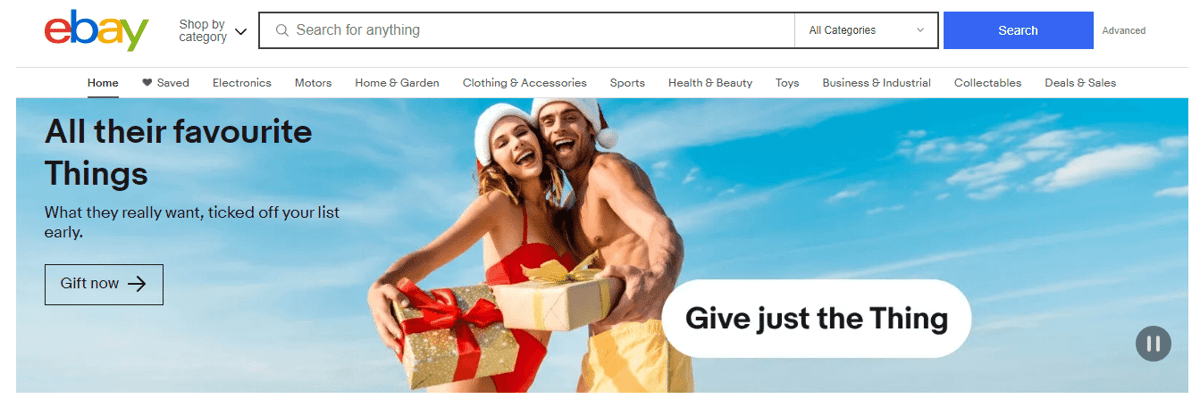
eBay enables its users to sell anything they want from eyelash extensions to irons.18 They can also sell worldwide, which means eBay’s users can extend their reach to different countries. However, its popularity means that it can be difficult to cut through the “noise” of the other sellers.
eBay also takes 10% of any sales – in some cases, creating an online shop would be cheaper. The other problem with eBay is that the buyer doesn't have to pay immediately, which can be frustrating when having to relist an item.
Selling Online on Amazon
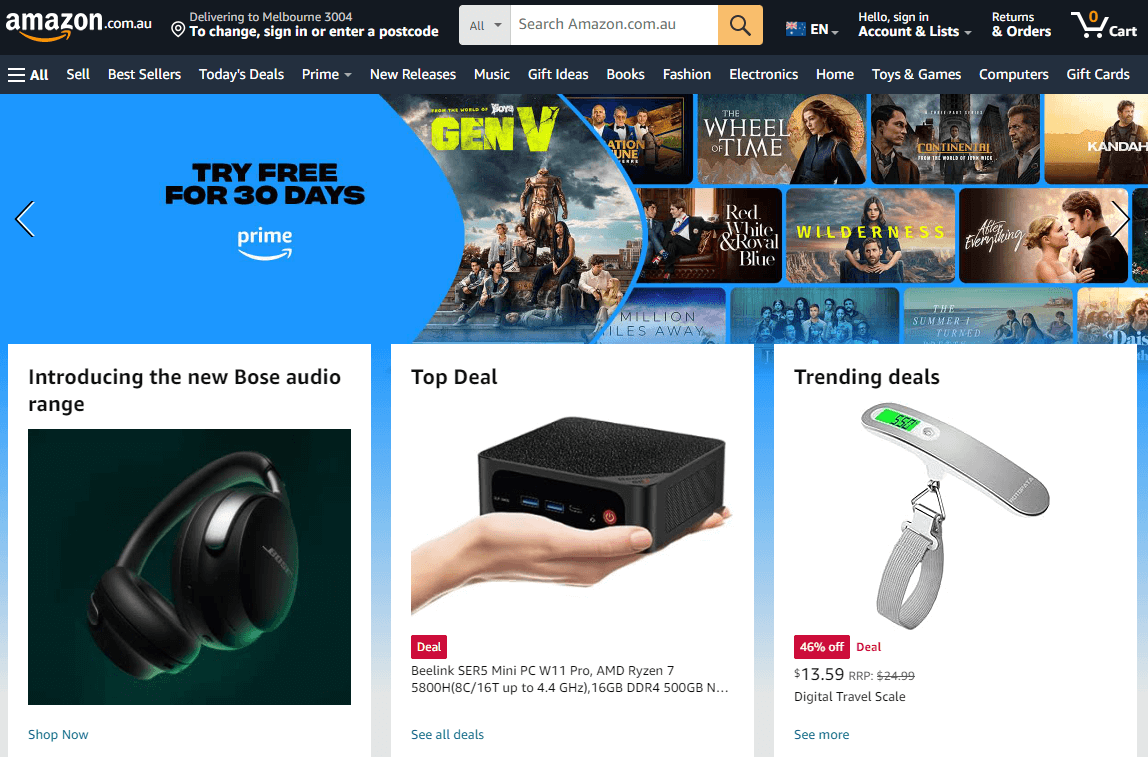
While Amazon only arrived in Australia in 2017, don't underestimate its potential.19 Thanks to its excellent reputation, the platform affords a certain level of authenticity when selling through it. This means buyers feel as though they’re buying directly from Amazon even when purchasing from a private seller.
Amazon's fees depend on the quantity of goods being sold, with users paying a flat fee per month plus a fee based on the variable rate of what's been sold. The platform is particularly popular among sellers of household goods, electronics, and books.
Selling online on Etsy
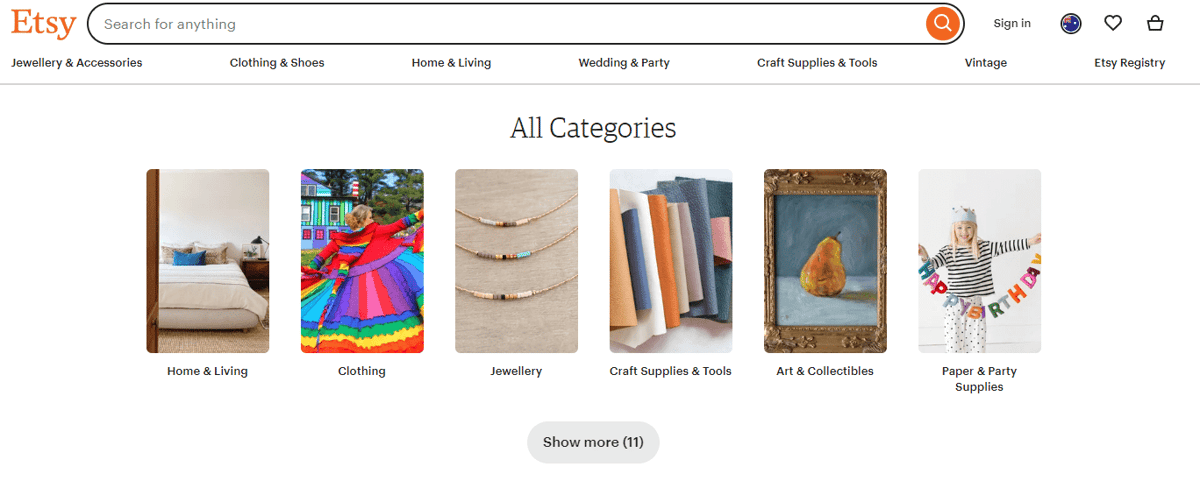
Etsy is a bit of a niche marketplace primarily created for sellers of handmade or vintage items.20 However the platform has expanded its catalogue over the past few years to offer digital products as well. Etsy can be incredibly profitable for products that fit their relatively affluent and predominantly female user base.
The store can be easily personalised without any technical experience or background knowledge. The downside is that it uses PayPal – along with your listing fees and final sales fees, sellers also have to foot the PayPal fees.
Final Thoughts
The basics of selling products online aren’t radically different from brick-and-mortar retail. Sellers have to pick their segment/niche, conduct market research, understand their target audience, create buyer personas, connect with suppliers, and create a brand before they can start selling online. Even on the storefront, things don’t diverge that much.
In offline business, sellers can own or lease their store space. Likewise, in eCommerce, store owners choose between running a self-hosted website, a hosted site on a third-party platform, or just having a store presence on a major marketplace.
Finding the right place for any online is important for success, whether that’s in physical retail or online sales. The decision between a self-hosted site, a marketplace, and a hosted site will depend entirely on the needs, growth aspirations, resources, and technical capabilities of the business.
It’s important to consider budget, knowledge base, and time constraints before committing. Several sites offer a free trial, so take advantage of this option and find out what works.
We hope you found something truly valuable in our in-depth guide on how to sell products online.
Commission Factory is not only the Asia-Pacific region’s largest affiliate network, working with more than 800 of the world's biggest brands, but is also a performance marketing platform that allows content creators and influencers to earn money and online businesses to increase sales.
Commission Factory has a demonstrated track record of helping its brand partners reach new and existing audiences, build awareness, and scale their online sales. Connect with the Commission Factory team to learn more about how we help to build brand awareness and grow affiliate sales.
References
- eCommerce - Australia | Statista Market Forecast
- What Is Dropshipping? How Does Dropshipping Work?
- 6 Website Personalisation Techniques to Improve Your Conversions
- Shopify
- Shopify Usage Statistics
- Shopify Pricing - Setup and Open Your Online Store Today – Free Trial
- SEO for Retailers: Why SEO is Important for eCommerce?
- What Is PCI Compliance? Everything You Need To Know – Forbes Advisor
- Cash Drawers for Your POS System
- BigCommerce
- BigCommerce Pricing and Plan Information
- WooCommerce
- Woo Express - WooCommerce
- Adobe Commerce: eCommerce Marketing Platform by Adobe Experience Cloud Australia
- Start Using Magento Open Source | Adobe Commerce
- osCommerce
- Online Advertising 101
- eBay
- Amazon.com
- All Categories - Etsy Australia
- Who Buys On Etsy? Understand Audience & Demographics (Statistics) | TechPenny


